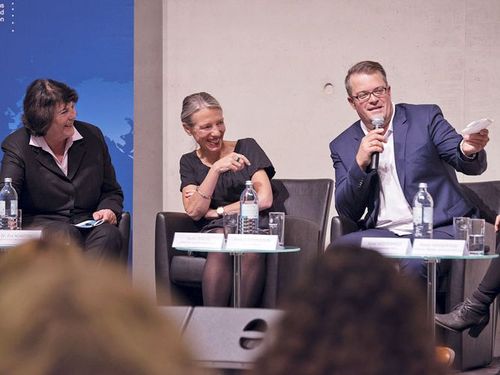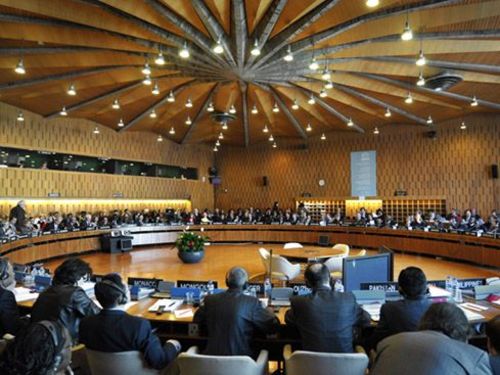Over the course of 75 years of membership, Austria has ratified 25 legal instruments, collaborated on a number of UNESCO programmes and thoroughly committed to implementing the Organization’s goals. Its participation can be seen in:
UNESCO Associated Schools
The UNESCO Associated Schools network is made up of 12,000 schools of all educational levels in more than 182 countries. The UNESCO Associated Schools are characterised by their aim of implementing UNESCO ideals – peace education, promoting democracy and human rights, environmental education, intercultural learning, etc. – in their day-to-day work. 106 Austrian schools are currently recognised as UNESCO Associated Schools.
UNESCO Chairs
Universities and research institutions that are committed to researching and teaching the UNESCO goals and topics are recognised as UNESCO Chairs. Of the approximately 870 UNESCO Chairs in 120 countries, six are located in Austria:
- UNESCO Chair in Intercultural and Interreligious Dialogue for South-East Europe University of Graz (since 2007)
- UNESCO Chair for Peace Studies University of Innsbruck (since 2008)
- UNESCO Chair for Cultural Heritage and Tourism University of Salzburg (since 2011)
- UNESCO Chair on Integrated River Research and Management University of Natural Resources and Life Sciences, Vienna (since 2014)
- UNESCO Chair for Bioethics Medical University of Vienna (since 2015)
- UNESCO Chair for Human Rights and Human Security University of Graz (since 2016)
- UNESCO-Chair for Conservation and Preservation of Tangible Cultural Heritage, University of Applied Arts Vienna (since 2019)
- UNESCO Chair for Sustainable Management of Conservation Areas, University of Applied Sciences, Klagenfurt (since 2020)
- UNESCO Chair for Global Citizenship Education – Culture of Diversity and Peace, Alpen-Adria-Universität Klagenfurt (since 2020)
- UNESCO Chair for Anticipatory Technologies and Future Design, University for Art, Linz (since 2021)
- UNESCO Chair for Digital Humanism, Vienna University of Technology (since 2023)
Biosphere reserves
Biosphere reserves are internationally recognised terrestrial and coastal ecosystems in which models for sustainable managements of the biospheres are developed, tested and implemented. Austria currently has four biosphere reserves: Grosses Walsertal, Wienerwald, Salzburger Lungau & Kärntner Nockberge and Unteres Murtal.
Geoparks
UNESCO Global Geoparks are areas with geological sites and landscapes of international geological significance that are managed based on a holistic understanding of protection, education and sustainable development. To this effect, they provide the opportunity to treat the conservation of the landscape and natural monuments not as an isolated effort, but to put it in the context of broader societal issues, such as global climate change, preserving natural resources and catastrophe prevention, etc. Austria currently has three UNESCO geoparks: Ore of the Alps Geopark, Karawanken Geopark and Styrian Eisenwurzen Geopark.
Cities Against Racism
The UNESCO European Coalition of Cities Against Racism (ECCAR) was set up in 2004 to tackle discrimination at a local level. UNESCO is currently cooperating with regional coalitions of cities in six regions of the world in order to develop practical and locally adapted strategies for tackling racism. Of the more than 100 European coalitions of cities, three are located in Austria, i.e. Graz, Vienna and Wörgl.
World Heritage
The UNESCO World Heritage list currently includes 1,223 sites of culture and nature in 167 countries, including ten World Heritage Sites located in Austria: the Historic Centre of the City of Salzburg, the Palace and Gardens of Schönbrunn, the Hallstatt-Dachstein/Salzkammergut Cultural Landscape, the Semmering Railway, the Historic Centre and Schloss Eggenberg in the city of Graz, the Historic Centre of Vienna, the Fertö-Neusiedlersee Cultural Landscape, the Prehistoric Pile Dwellings around the Alps, parts of the Ancient and Primaeval Beech Forests of the Carpathians and Other Regions of Europe, a component part of the Great Spa Towns of Europe as well as parts of the Frontiers of the Roman Empire - The Danube Limes (Western Segment).
Intangible cultural heritage
Intangible cultural heritage includes practices, portrayals, forms of expression, knowledge and skills that communities, groups and, if applicable, individual persons understand as part of their cultural heritage. At the same time, this term also encompasses instruments, objects and cultural spaces that are tied to the respective cultural heritage. The international lists over 700 elements from across the world, including ten Austrian traditions on the Representative List of the Intangible Cultural Heritage of Humanity: Falconry, Schemenlaufen – the carnival of Imst, Classical horsemanship and the High School of the Spanish Riding School Vienna, Resist block printing, Avalanche risk management, Transhumance, Knowledge on Lipizzan Horse breeding, Timber rafting, Traditional Irrigation and Dry Stone Constructions. Since 2016, there have also been three Austrian centres for craftsmanship (Hand.Werk.Haus Salzkammergut, Textiles Zentrum Haslach, Werkraum Bregenzerwald) and since 2020 the Craft techniques and customary practices of cathedral workshops (Dombauhütten) on the UNESCO Register of Good Safeguarding Practices. On a national level, the Austrian list counts more than 172 entries.
Diversity of Cultural Expressions
At the core of the “UNESCO Convention on the Protection and Promotion of the Diversity of Cultural Expressions” stands an effort to foster an environment in which artistic and cultural diversity can develop freely and be protected from a purely economic approach. Of course, it is true that cultural expressions such as literature, theatre, music, film or the visual arts have an economic value as consumer goods; however, their value is in no way limited to this aspect. As sources of meaning, significance and artistic perspectives, they convey identities and values and thus contribute to social cohesion. As such, the Convention recognises the right of all states to actively shape their cultural policies and to take steps against unrestricted deregulation of art and culture. At the same time, the Parties to the Convention have an obligation to ensure that favourable conditions for a diversity of art and culture can be maintained. As such, alongside cultural policy, the Convention also highlights the areas of policy that impact cultural creativity, the cultural activities on offer and cultural participation – from educational policy, to media policy and trade policy.
UNESCO Creative Cities Network
UNESCO Creative Cities programme works to create a worldwide network of cities that are using their creative potential to aim for a common goal of cultural diversity and sustainable city development. Cities can apply for participation in seven areas: film, music, design, gastronomy, media arts, crafts and folk arts or literature. The network, which was created in 2004, serves as a platform for exchanging experiences, ideas and practical examples in the fields of art and culture, as well as the creative economy. More than 100 cities around the world are represented in the network, two of which are located in Austria:
- Graz UNESCO City of Design (since 2011)
- Linz UNESCO City of Media Arts (since 2014)
Memory of the World Register
UNESCO keeps a Memory of the World Register to preserve documentary heritage – books, manuscripts, audio-visual materials in libraries and archives – worldwide. The register currently lists more than 470 entries and Austria holds a total of 15 entries on the world register: the Vienna Dioscurides, the final document of the Vienna Congress, the historical collections of the Vienna Phonogrammarchiv, a papyrus collection, the Schubert collection, the Atlas Blaeu-Van der Hem, the Brahms collection, the Gothic architectural drawings, the Tabula Peutingeriana, the Arnold Schönberg Estate, the Mainz Psalter and, as a communal registration, the Bibliotheca Corviniana, the Golden Bull, etc. The national register for Austria includes more than 70 entries of culturally significant and historically important documents and collections.



